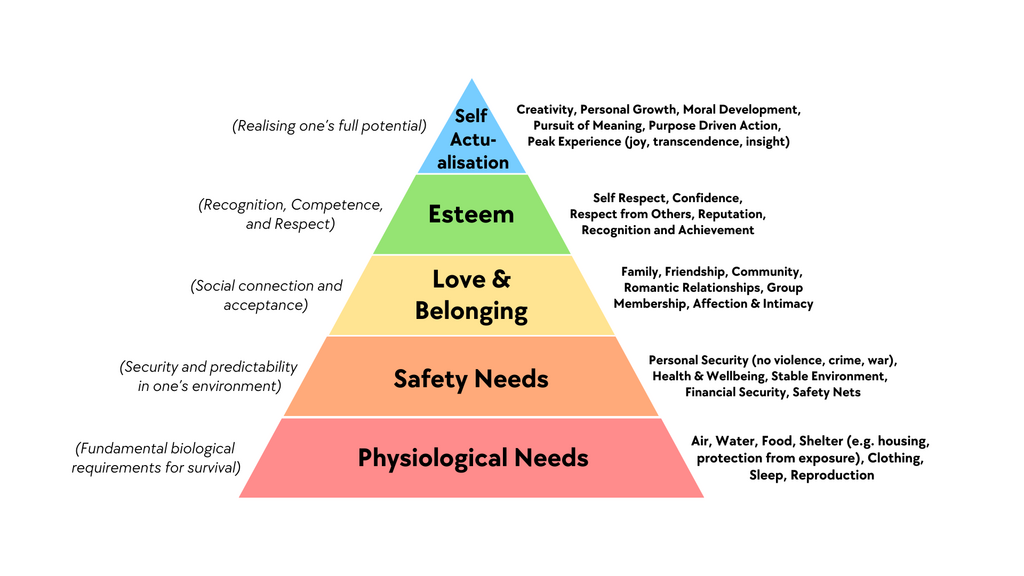Need or Aspirations, which one is more relevant?
Today’s Fast-Forward Generation (FFGen), which includes millennials (born 1981-1996) and Gen Z (born 1997-2012), is growing up in a world that is constantly changing and evolving. FFGens are exposed to new information and technologies at an unprecedented pace, and they are expected to be able to adapt and learn quickly. This can be both exciting and overwhelming, as well as difficult in terms of knowing what is most important to focus on. At the same time, the boundaries between needs and aspirations are shifting rapidly.
So, what should the FFGen focus on – Needs or Aspirations?
To answer this, let’s look at Abraham Maslow’s Hierarchy of Needs, a well-known model, where he defines five stages of needs based on his Motivational Theory (1943).

Needs of the FFGen
Today, the FFGen is highly aspirational; the very concept of a need-based approach is redundant. To thrive in today’s world, FFGen aspires to develop a much stronger foundation. This is because, as per the Hierarchy of Needs, what was earlier considered the highest state of achievement- ‘Self-actualization,’ may not follow the hierarchy of needs. Similarly, what was considered a basic need way back in 1943 – food, clothing and shelter – is now dependent on the aspirations of an individual.
Let me give you a few thought-provoking examples based on my interactions with FFGen:
- An individual has great relationships with family and friends and believes that happy and harmonious relationships are his key life goal, and his aspiration for other dimensions may not be high. Would we call him a happy & successful person as he achieved what he wanted?
- Another individual is well settled in his career and has decent financial stability, but poor relationships with his parents or children. Would we call him a failure because his current goal is to make money?
- The only son of an ultra-rich industrialist has all his needs, wants, and desires (based on Maslow’s hierarchy of needs) taken care of. Should he only focus on the path of self-realisation or self-actualisation? What about his aspirations to build his own empire?
- A young lady is passionate about making the world a better place to live in and believes in giving something meaningful back to society, but gives little or no attention to her material aspirations. Would we call her unsuccessful while she gains tremendous respect in her community?
- “One last example close to my heart: At a recent Diksha (Monkhood) ceremony in Mumbai, India, 16 men and women, most under the age of 30, took the Mahavir Jain vow of renunciation. This also included somebody who topped the medical exams, and most of them came from wealthy families, and some from absolutely well-supported families. What motivates these young New Genres to give up worldly possessions? And what is the payback of life that is stripped bare? Now if it is by choice that all your aspirations revolve around spiritual development, would we call it a success or a failure?
Some of their common aspirations include:
- Making a difference in the world: They are more aware than ever before of the challenges facing the world, and they want to play a role in making it a better place.
- Having a successful career: They want careers that are challenging as well as rewarding, and they want to make a positive impact on the world with their skills and talents.
- Creating a meaningful life: They want to live lives that are full of meaning and purpose, they want to have strong relationships and pursue their passions.
- Work-life balance: They want to have their space and time, as they value their social life.
Going back to the question raised at the beginning of this post– which one is more relevant?
I would say, all of it matters, especially from the perspective of the new definition of ‘Needs’, which are defined by the ‘Aspirations’ which you want to achieve and not anymore by the motivational concept alone.
In my book, Define Your Orbit (2020), I introduced this philosophy and a unique model of the Hierarchy of Aspirations. In many ways, the first step of my hierarchical model begins at the fourth level of Maslow’s Model.
For more insights on the ‘Hierarchy of Aspirations’, read my book – Define Your Orbit: Success a Matter of Chance or Choice.
Amazon: https://amzn.in/d/bSfjFPH
Story Mirror: https://shop.storymirror.com/define-your-orbit/p/16se70k6olo2h7a6d
